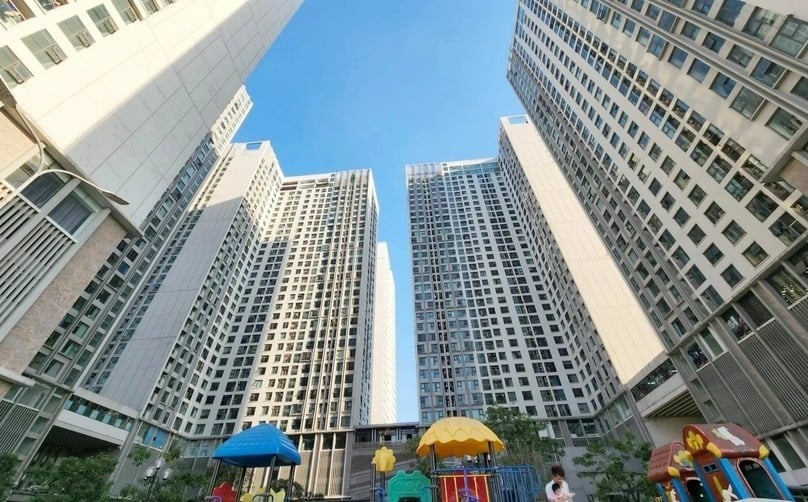By
Dr. Nguyen Van Khoi
Sun, March 23, 2025 | 2:18 pm GMT+7
The imbalance between supply and demand and challenges from infrastructure and planning are two of the outstanding challenges for the Vietnamese real estate market in 2025, writes Nguyen Van Khoi, chairman of the Vietnam Real Estate Association.

An apartment complex on Nguyen Xien street, Hanoi. Photo courtesy of Dan Tri (Intellect) newspaper.
Imbalance in real estate supply and demand
The imbalance in the Vietnamese real estate market is a major issue that seriously impacts the sustainable development of the sector. Many real estate projects focus primarily on developing high-end products for wealthy customers. This has led to an oversupply of luxury properties, including high-end real estate, villas, and apartments, while there is a severe shortage of social and affordable housing for the majority of the population.
This imbalance results in numerous unsold projects, putting pressure on business cash flows. As a result, many high-end apartments remain vacant, causing a significant waste of social resources, while most people still struggle to find affordable housing.
The main reason for this situation is the lack of a coordinated development strategy. Incentive policies are not strong enough, and bureaucratic procedures are overly complex, making businesses reluctant to invest in the affordable housing sector.
To address this issue, clear support policies need to be implemented, and administrative procedures should be simplified to create a more favorable environment for businesses to develop social housing. This would help rebalance the market to better meet the needs of the majority of people.
Challenges from infrastructure and planning
The slow development of urban infrastructure and the lag in planning have become significant barriers for the Vietnamese real estate market. As urban areas expand rapidly, populations grow, and housing demand increases, essential infrastructure – such as transportation, electricity, water, and wastewater treatment – is struggling to keep up. This has led to severe traffic congestion, flooding after heavy rains, and a shortage of basic public services, all of which affect the quality of life for urban residents.

Dr. Nguyen Van Khoi, chairman of the Vietnam Real Estate Association. Photo courtesy of Constructtion (Xay dung) magazine.
Moreover, current urban planning has many shortcomings. It lacks flexibility and its updates are too slow compared to the pace of development. Many localities approve rigid, outdated plans that are disconnected from reality and do not align with socio-economic growth. As a result, large real estate projects face delays and multiple revisions, causing significant financial losses for businesses and residents and reducing the attractiveness of investment.
To overcome these challenges, local governments must invest heavily and synchronously in developing essential infrastructure while improving inter-sectoral coordination in urban planning in a more sustainable, flexible and scientific manner.
Only when infrastructure and planning align with urban growth will the real estate market be able to develop stably and sustainably, contributing positively to the country’s overall socio-economic development.
Difficulties in accessing capital and financial risks
Despite the government’s positive reforms to support the real estate market, businesses, particularly small and medium-sized enterprises, still face significant challenges in accessing credit.
One of the main reasons for this is that borrowing conditions remain strict, requiring high collateral and complicated procedures, making it difficult for businesses to qualify. Furthermore, lending interest rates remain high, which increases investment costs and puts additional pressure on debt repayment for both businesses and homebuyers.
As a result, many promising projects are delayed or halted, restricting the recovery of the market and limiting development opportunities. While large enterprises can mobilize capital from diverse sources, small and medium-sized enterprises are almost entirely dependent on bank loans, making them more vulnerable to market fluctuations and monetary policies.
To resolve this issue, more specific policies are needed to reduce interest rates, simplify loan procedures, and expand access to alternative financial sources such as investment funds and corporate bonds. Only by addressing the capital access issue thoroughly can the Vietnamese real estate market stabilize and grow sustainably.
Furthermore, social housing buyers are facing difficulty accessing loans due to high interest rates, short repayment periods, and financial constraints (less than 20% equity), preventing them from borrowing 80% of bank capital under the VND145,000 billion ($5.66 billion) package.
Implementation of new laws related to the real estate market
New legal policies have created opportunities for the real estate market to operate more transparently and sustainably. However, as of 2025, challenges remain as the new laws and regulations need time to show effects. The market still needs more time to adapt, meaning the expected positive impacts may not fully materialize in practice and may only remain at the level of trust.
While the new laws bring positive changes, their implementation has showed many problems, causing confusion that can result in delays and uncertainty, which poses risks for businesses. One of the key challenges is the issue of land valuation and land use fee calculation, which has caused bottlenecks for many projects in various regions. New regulations on land prices will have a significant impact on the real estate market, affecting the accessibility of land for projects and potentially driving real estate prices higher.
There need to be a solution to regulate and calculate land use fees, land rents, taxes, and charges in a way that reflects the actual conditions of each locality. This approach should aim to balance the interests of all parties involved, while minimizing negative impacts on the market and harmonizing the interests of stakeholders.
Risks from the corporate bond market
The use of corporate bonds in the real estate sector has recently been accompanied by numerous risks, leading to the potential for defaults and undermining investor confidence. These issues have a negative impact on the entire market.
Legal risks and land disputes
Many real estate projects continue to be mired in legal procedures, land clearance issues, and prolonged land disputes, leading to project delays and rising investment costs. This situation erodes investor and customer confidence, further complicating market conditions.
Risks from global economic fluctuations
Vietnam’s real estate market is heavily influenced by global economic trends, particularly factors such as economic recessions, trade wars, fluctuations in exchange rates, and changes in international interest rates. These fluctuations directly affect capital mobilization, foreign direct investment (FDI) flows, and the sentiment of foreign investors.
There are some solutions for Vietnam’s real estate market.
Tightly control credit and capital markets
It’s crucial to continue implementing measures to control the rise in commercial bank interest rates, strengthen oversight, and ensure transparency in the corporate bond market to reduce the risks of bubbles and maintain market stability. Additionally, mobilizing all sources of capital and quickly establishing the National Housing Development Fund is essential. A credit mechanism should be set up for buyers of social and affordable housing to facilitate access to financing.
Promote development of infrastructure and smart cities
The government needs to invest significantly in infrastructure and promote the development of smart cities, utilizing advanced technologies to increase resilience to climate change.
Improve the legal environment
The legal system should be perfected, with administrative procedures streamlined to help businesses reduce costs and shorten project timelines. Local authorities should implement policies and mechanisms tailored to the specific needs of their localities, within the framework of the law.
Develop real estate products to meet real needs
Priority should be given to the development of low-cost housing projects and social housing while reducing speculation. This will help the market grow in a stable, healthy, and sustainable manner.
In conclusion, Vietnam’s real estate market in 2025 presents significant opportunities but also faces considerable challenges. To effectively capitalize on these prospects and overcome obstacles, coordinated efforts between government agencies, businesses, and society at large are essential. This collaboration will be key in building a strong, sustainable real estate market that contributes positively to the nation’s aspirations for prosperity in the new era.
From: The Investor
Real Estate News










